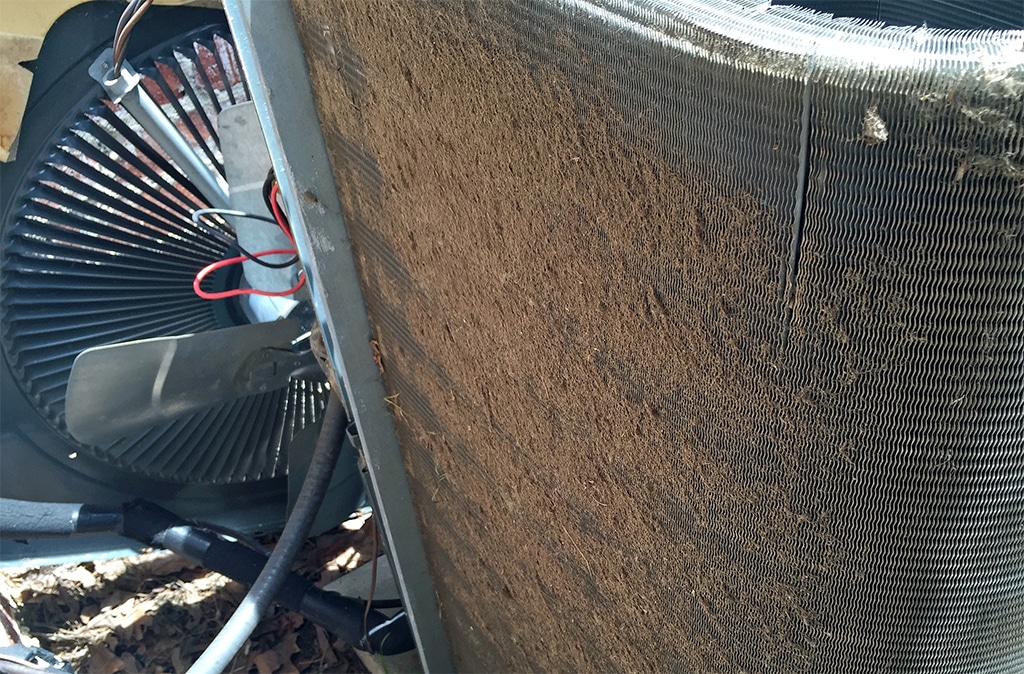
Your Reliable Air Conditioning Repair Technician’s Advice On Effects Of Dirty Condenser Coils On Your AC | Dallas, TX
Whenever winter or summer approaches, homeowners spare no effort in ensuring that their HVAC systems are in great state to ensure that their homes are properly cooled or heated. Some even have air conditioning repair technicians come over for an inspection and tune-ups of their HVAC systems, while others purchase and install new systems. The last thing they want is for their family to experience the discomfort caused by the scorching heat or cold temperatures.
With heating and air conditioning systems accounting for most of the electrical energy used at your Dallas, TX home, routine maintenance will help in lowering the costs by cutting the costs. An HVAC system comprises many components, among them the condenser coil. However, this component is prone to getting dirty because of dust accumulation. Having an air conditioning repair technician clean the coils is a great air conditioning service that helps your system run effectively. In this post, we’ll examine the benefits of cleaning the coils and the effects if they are dirty to ensure that you are better informed.
What Are Condenser Coils?
Consider what a condenser coil does and what it is to appreciate the need for having them clean. So, what is a condenser coil? It is a component of your HVAC system that helps release heat from your home into the outdoor space. It is usually installed in the outdoor unit of your HVAC system. The compressor in your outdoor unit is responsible for pressuring and heating the refrigerant that can enter the condenser coil.
Here, the gas refrigerant heat is moved to the air above the coils and later into the atmosphere. As the refrigerant dissipates the heat, its temperatures reduce, turning it back into a liquid. Hence, the HVAC system must have sufficient coolant for your home to be properly cooled or heated. Fortunately, the unit doesn’t use any refrigerant, meaning a decline in its levels points to a leak. Hence, you might want periodic maintenance done by a licensed air conditioning repair pro.
What Can Happen If the Condenser Coils Are Covered With Dirt?
Fouled or dirty condenser coils are among the most often air conditioning repair problems in the air conditioning and commercial refrigeration sectors today. If the condenser coils are fouled or dirty, their ability to expel heat from your Dallas, TX home is affected to a great extent. The main functionality of a condenser coil is to condense the coolant in vapor form back into a liquid state. However, the process of condensation is system dependent. Most of the condensing happens in the lower part of the condenser.
Upon reaching the condensing or saturation temperatures and the refrigerant gas reaches 100% saturation vapor, if any extra heat is removed, condensation will occur because more heat is withdrawn from the saturated vapor, which forces it to change into a liquid through condensation. During the condensation, the gaseous coolant will gradually change its state until the total liquid remains. This change of state or phase change is an instance of rejection of latent heat as only latent heat is removed, not the sensible heat. To ensure that the process continues uninhibited, your HVAC system needs to be efficiently functioning. This means it must be regularly maintained and have timely air conditioning repairs. The following are the ways through which dirty coils affect your air conditioner:
There Is Less Heat Transfer
Less heat can be transferred from the coolant to the ambient air around a condenser if it becomes fouled, damaged, or dirty. If fouling prevents an air-cooled condenser from ejecting as much heat to the surrounding air, heat will build up inside the condenser and increase the condensing temperature. You should have an air conditioning repair technician inspect your system if you notice less cooling.
When the condensing temperature increases, there will eventually come a moment where the temperature differential (delta T) between the ambient air and the condensing temperature is sufficient to reject heat from the clogged or dirty condenser. The heat transmission increases with increasing temperature differential. Because of the greater condensing pressure and temperature, which result in high compression ratios, a filthy condenser will still be able to eject sufficient heat at the higher temperature differential to keep the air conditioning system operating.
When the condenser coils are dirty, damaged, or fouled, the temperature of the subcooled liquid exiting the condenser will certainly be higher. As a result, there will be more flash gas at your metering device and less net cooling effect since the liquid temperature coming out of the condenser coils will be further away from the evaporating temperature. This means that your home will not be efficiently cooled. The HVAC system will also use more energy to attain the thermostat’s set temperatures. Have You noticed that some parts of your Dallas, TX home aren’t cooled properly while there is a spike in utility bills? You should have an air conditioning repair technician come over for an inspection.
The increased condensing pressure and temperatures will result in a larger compression ratio, which will raise the discharge temperature of the compressor as well. The suction pressure vapor must be compressed to a higher discharge or condensing pressure, which requires more energy from the compressor. Larger discharge temperatures & higher amperage pulls are the main signs of this additional energy.
Condensing Temperature Becomes High
The compressor should compress the coolant from the evaporating (low-side) pressure to a raised high-side (condensing) pressure in elevated condensing temperatures resulting from a fouled condenser. The compression heat will increase due to the additional compression work, raising the compressor’s discharge temperature. Unfortunately, this will strain your system, resulting in frequent air conditioning repairs.
Due to the phase transition, there is a link between pressure and temperature at the condensing temperature. To determine the condensing temperature, all that is required is a gauge measurement on the higher side of the system. As long as pressure losses and drops in the lines and valves are minimal, this can be gauged anywhere on the higher end of the cooling system. If you translate this pressure into temperature using a temperature/pressure chart, this is the condensing temperature. The ASHRAE 400 Series mixes of refrigerants, a near-azeotropic mixture, are an exception to this rule. When they change phase, there is a range of temperatures or a temperature glide.
High Compression Ratios
A high compression ratio results from low evaporator pressure, high condensing pressure, or both. At any given time, when the condensing pressure is high, or there is low evaporator pressure, or both, your system will experience high compression ratios. As a result, your system will have to do more work to heat or cool your Dallas, TX home. This means more air conditioning repairs and wearing out of different parts of your system. Since the compression stroke will be doing more work, there will be an increase in the heat of compression. As a result, the compressor will have a high discharge temperature. The pressure or compression ratio is the absolute or total discharge pressure divided by absolute suction pressure.
Some air conditioning repair technicians usually forget to evaluate the compression ratio when troubleshooting an air conditioning system. The discharge temperature, however, is crucial because it represents the heat received in the suction line or evaporator and any heat of compression produced during the compression process.
Since there is no link between pressure and temperature because of the superheated discharge temperature of the compressor, a temperature measuring device must read the temperature directly on the discharge line. Because oil breakdown and carbonization can happen if the compressor discharge temperature value is exceeded, it should never be higher than 225°F. When an air conditioning repair technician comes to test your system, they may diagnose the following as the reason for the high discharge pressure; high condensing temperature, high compression ratio, and low evaporator temperature.
Low Volumetric Efficiency
A high compression ratio, especially for piston-type compressors, may lower the volumetric efficiency of the condenser coils. The volumetric efficiency is denoted in a percentage and defined as a ratio between the volume of the compressor-pumped coolant gas to the total volume that the compressor pistons displace. Could this result in an air conditioning repair? Absolutely.
High volumetric efficiency implies that fresh coolant from the suction line, rather than gases that have already expanded to fill the clearance volume, fills more of the cylinder capacity of the piston. The more refrigerant is put into a cylinder with each downstroke of the piston, the more the volumetric efficiency. As a result, each crankshaft rotation will result in the circulation of the additional refrigerant. As a result, the system is more effective and has a higher capacity.
Therefore, the less gas from the discharge expands to the suction pressure, the lesser the discharge pressure. Additionally, the larger the suction pressure, the less gas expansion after discharge. This occurs because the suction valve will open sooner due to the discharge gases expanding to the greater suction pressure less quickly. The system pressures have the biggest impact on the volumetric efficiency of the compressor, resulting in a need for air conditioning repair. Volumetric efficiency will decrease the further apart the suction and discharge pressures are in magnitude.
As previously mentioned, the compression ratio determines how often the discharge pressure exceeds the suction pressure or their respective magnitudes. Higher volumetric efficiency and low discharge temperatures result from lower compression ratios. It is important to maintain either low condensing, high evaporator, or both to keep the compression ratios at the lowest level possible. Have an air conditioning repair technician come over for an inspection.
Why Should You Clean the Condenser Coils?
The condenser coils accumulate dust and dirt, affecting their overall performance and that of your entire air conditioning unit. As explained above, dirty condenser coils lead to high condensing temperatures, low volumetric efficiency, and high compression ratios. Below are reasons to have an air conditioning repair technician in Dallas, TX come over for regular cleaning of the condenser coils:
To Save on Costs
Your air conditioning system should keep your indoor space comfortable and cool. However, this will only happen when the condenser coils are optimally performing. If a layer of dirt, grime, or debris covers your condenser, it gets harder for this critical component to function efficiently. You will have to put in extra effort to cool your house. As a result, you’ll start paying a high electricity bill. Hence, you want to have an air conditioning repair technician tune up your air conditioner to ensure that the condenser coils are clean. Remember, if the condenser coils are dirty, they’ll be unable to release the heat efficiently.
Increased Lifespan
Heating and air conditioning products are designed to last for a long time. However, if the AC is inefficient, it is highly likely to experience premature wear and tear. As mentioned above, the dirty condenser coils make your unit put extra effort, putting strain on the various internal components. Your air conditioner will have a shorter service life whenever the refrigerant system wears out. To ensure that you don’t have to replace it prematurely, you should enlist the help of an air conditioning repair technician in Dallas, TX for inspection, cleaning, and maintenance.
To Avoid the Various Inconveniences of a Breakdown
You don’t want your air conditioner malfunctioning in winter because it can pose a serious risk to you and your family. It also makes your home uninhabitable. Unfortunately, this is likely to happen with a dirty air conditioner. However, cleaning the condenser coils, having routine maintenance, and timely air conditioning repairs can help avert this.
There are many reasons to have your AC coils cleaned. If you need your Dallas, TX, home’s AC coils inspected and cleaned, contact us at One Hour Air Conditioning & Heating of Dallas, your reliable air conditioning repair company.





